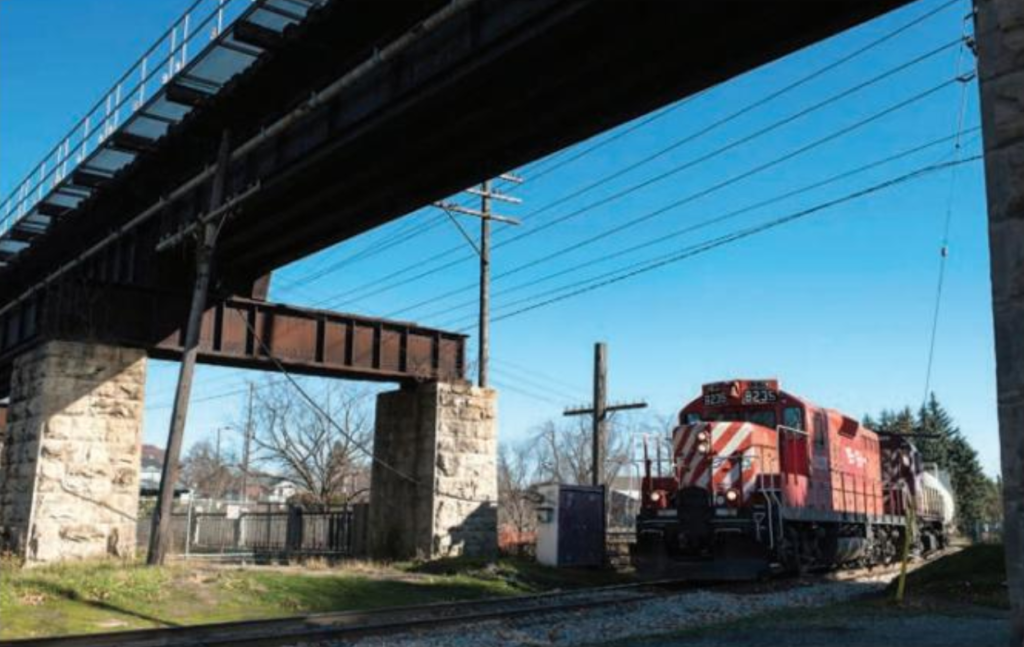Guelph Junction Railway has been transporting industrial products such as grain, plastics, and lumber for over 130 years.
The City of Guelph has what few other municipalities in Ontario or Canada can boast: a successful short-line railway that connects to two of Canada’s Class 1 rail freight railroads and the in-house expertise to help companies of all sizes realize the benefits of moving goods by rail.
The 38.6 kilometres of the Guelph Junction Railway (GJR), which is entirely owned by the City of Guelph, connects to the Canadian Pacific Railway in the south end of the municipality and to Canadian National Railway’s line in the north. It serves the city’s north industrial park and traverses through the heart of the downtown, providing the local link for long-distance delivery.
Connections to both of Canada’s major rail companies is a huge business advantage for companies in Guelph, says GJR general manager Les Petroczi.

“Having that ability to get competitive quotes is really great for our customers. Most municipalities can’t offer that.” Guelph is also well served by a number of large, well-equipped transloading facilities that transfer freight from truck to rail or rail to truck for customers that aren’t on a direct rail line.
In addition, GJR provides storage for rail cars for its customers.
“We know our customers and we are there for them. We offer services that are reasonably priced and we’re there to help them grow. The GJR is a big incentive for businesses to come to Guelph,” says Petroczi.
The GJR has also built expertise and experience to help customers make the most of the line and the efficiency it brings.
Guelph has a short-line railway connecting-cp-rail/ cn-rail and business
“We are willing and able to work with any customer who wants to come to Guelph. We will build infrastructure to help customers grow, including grade preparation, and handling a rail connection to the line. All a GJR customer has to worry about is ensuring they are satisfying their own customers. I worry about everything else.”
The GJR began operations in 1888 and has been inextricably linked to the economic success of Guelph ever since.
It now carries large quantities of grain, plastic pellets, lumber, aggregates, chemicals, iron, stone, glass and paper for 16 customers on more than 5,000 rail cars a year. The GJR reported a net income of $1.1 million and delivered dividends to the City of $80,000 in 2019.
Moving freight by rail – raw materials in and finished products out – provides major benefits over trucking. A single rail car can hold the equivalent of four tractor-trailers and is never slowed down by congestion on highways or at the border, making rail a more cost-effective and reliable form of transportation.
It’s also environmentally friendly. The operation of all of Canada’s rail companies combined contributes just 1 per cent of the country’s greenhouse gas emissions.
The GJR reinvests a minimum of 16 per cent of its revenues into modernization, including upgrades to the rail lines to allow the use of wider and heavier rail cars used by Class 1 carriers, improvements to level crossings and larger LED signal lights.
The GJR’s rail operations are contracted to a third-party operator, which provides locomotives and crews. A contract with a new provider begins in September.
“They have a lot of experience and are proven to be great freight managers,” says Petroczi, who has had a long career in private- sector rail service.
Only a handful of municipalities operate a short-rail line and very few actually make money, says Petroczi. There are only two other wholly municipally owned railways in Ontario and a dozen across the country.
Guelph is at the centre of Canada’s Innovation Corridor, the second-largest technology cluster in North America. It is home to some of the country’s leading advanced manufacturers and is also an agricultural, agri-food and animal sciences hub. Guelph’s central location provides easy access to major highways, five international airports, two major shipping ports, and four road border crossings.
Three additional border crossings, a dedicated commercial truck ferry and a dedicated freight train tunnel are within 300 kilometres.
If you require further information on the Guelph short line railway connecting CP Rail and CN Rail, please contact Les Petroczi, General Manager, Guelph Junction Railway (phone) 519-822-1260 extension 2825 or email les.petroczi@guelph.ca. For complete information about the Guelph Junction Railway visit their website here.
















